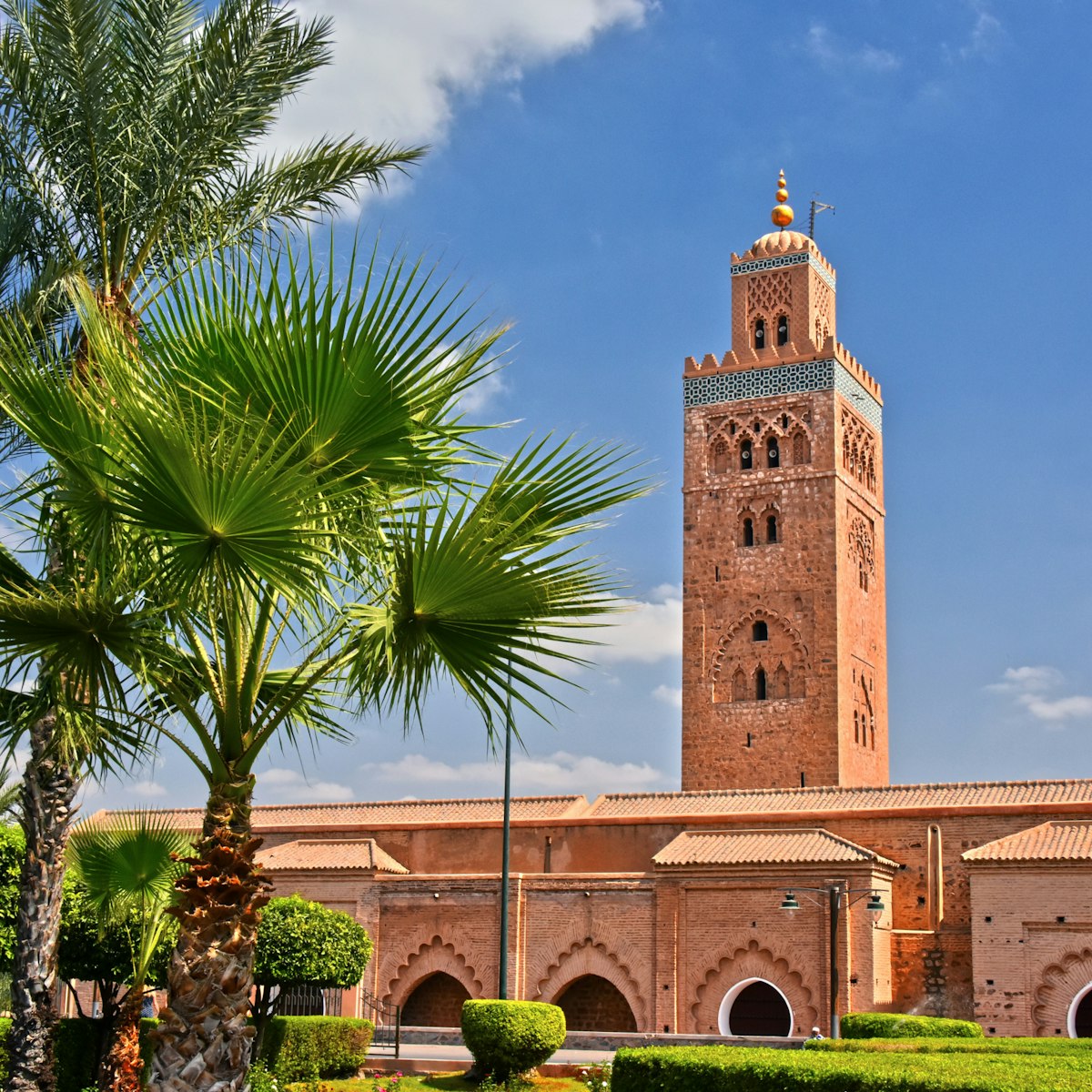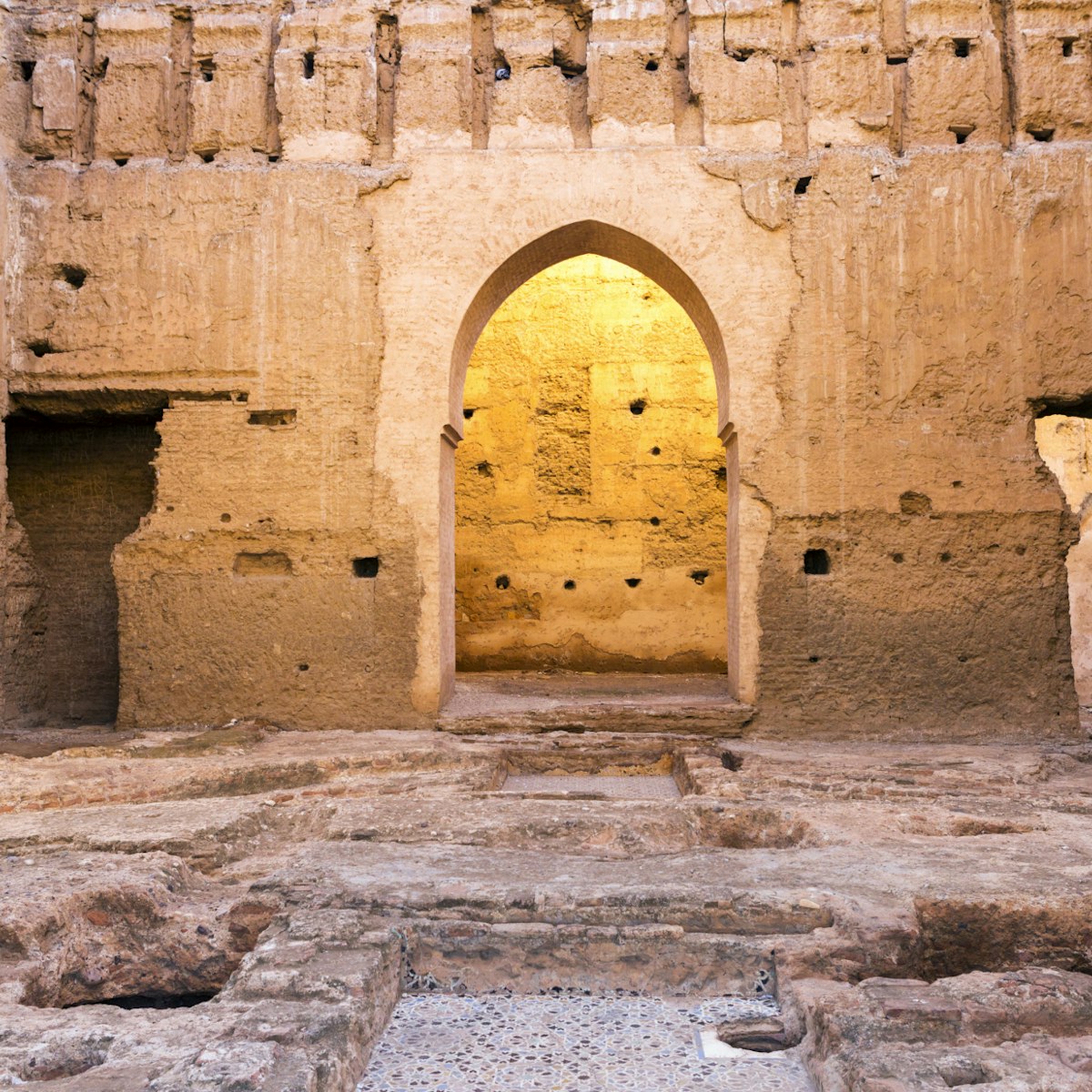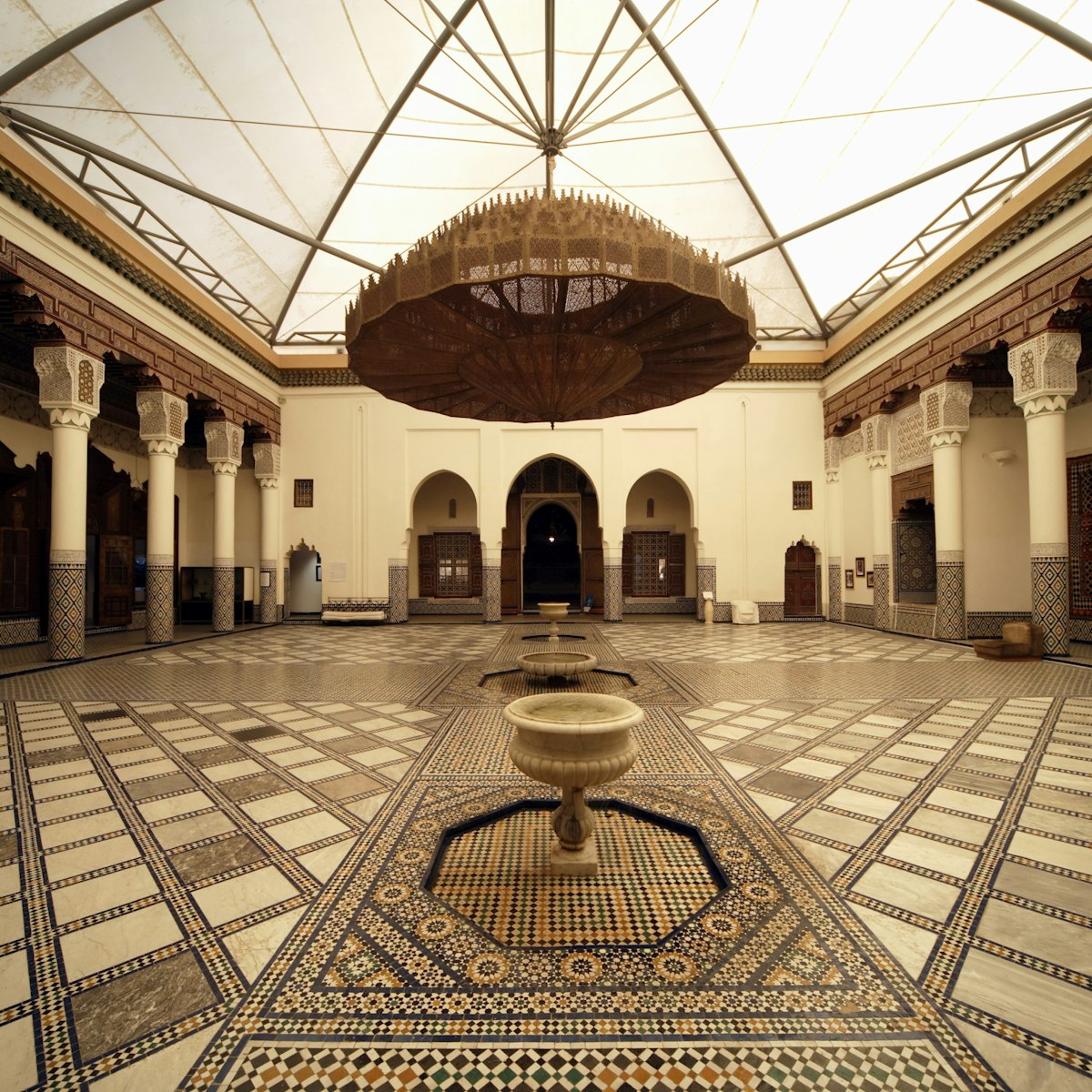This captivating museum, opened in 2017, showcases finely selected collections of haute couture clothing and accessories that span 40 years of creative work by legendary French fashion designer Yves Saint Laurent. The aesthetically warped and wefted building resembles woven fabric and holds a 150-seat auditorium, research library, bookstore and terrace cafe serving light snacks.
Architecture of Musée Yves Saint Laurent
Undoubtedly the most thrilling example of contemporary architecture in Marrakesh, Musée Yves Saint Laurent rises from a granito base of Moroccan marble and stone, draped in a lacework of terracotta bricks. The textured arrangement of the bricks is designed to resemble the weft and warp of fabric. Step inside and it's a complete contrast, with a silky smooth finish intended to complement the exterior like the lining of a couture jacket.
The museum was designed by Studio KO and was the brainchild of Yves Saint Laurent's partner Pierre Bergé (1930–2017), who wanted to create a repository of the fashion designer's work that was "profoundly Moroccan." To this end, the building was designed without external-facing windows, to emulate Marrakesh's traditional riads. The terracotta color of the exterior brickwork mirrors the dominant hue of Morocco's "Red City."
Like a traditional house of the medina, internal patios are an integral design feature of the Musée Yves Saint Laurent. The first is a striking circular walk-through that segues between the museum entrance and internal exhibition spaces. Here a series of stained-glass windows echoes the work of French artist Henri Matisse, who greatly influenced YSL's designs. The second patio forms the heart of the building, a square chamber covered with zellige (colorful geometric mosaic tilework) with a giant circular dish that catches the rain. The use of green here is significant, as it's highly prized in both Amazigh and Islamic cultures.
Main exhibition at Musée Yves Saint Laurent
The core of the museum is the Yves Saint Laurent Hall, a permanent display of his sketches, rotating haute-couture fashions and color-themed accessories. The backdrop is entirely black – a key color in YSL's designs – creating a cavernous cocoon pierced only by audiovisuals of the designer's catwalk shows and recordings of him speaking.
On the right-hand wall as you enter, the exhibition starts with a biography of Yves Saint Laurent constructed from personal artifacts, including a letter sent by YSL to French Vogue's editor-in-chief Michel de Brunhoff in June 1954 at the age of 17.
Top-quality temporary exhibitions, which change two or three times a year, are held in a smaller adjacent room.
YSL's Theater
Yves Saint Laurent's attention-grabbing fashion designs owe more than a little to his reverence of the stage and screen. Tapping into this theme, the Musée Yves Saint Laurent incorporates a 150-seat auditorium with state-of-the-art acoustics. It is designed for the projection of films, live performances and broadcasts of theatrical performances from around the world; check the website for the schedule. Outside the auditorium entrance, don't miss the "Costumiere," a fascinating display of YSL's sketches of costumes he made for cinema and the theater.
Museum library
By appointment, visitors can access Musée Yves Saint Laurent's 1st-floor library and study room, an important repository of 5000 books on botany, fashion, and Amazigh and Arab-Andalusian culture. Much of it is the personal collection of Yves Saint Laurent and Pierre Bergé.
History of YSL in Marrakesh
Yves Saint Laurent's love affair with Marrakesh began in 1966 – by the end of his first visit, he'd acquired the deeds to a house in the medina. The Algerian-born French fashion designer (1936–2008) was fascinated by the artistry and palette of Morocco. This museum opened as a homage to his work and the inspiration he drew from his second home.
YSL found career-defining inspiration in the beauty of Morocco, with all its raw forms and pure colors. He marveled at the gardens of Marrakesh, where nature parades on overdrive, and the brightly hued caftans of women in the medina. He found inspiration in the stark blue skies, the earthen architecture and the dramatic waving dunes of the southern deserts. Nomadic fashions for cuffs and collars are hinted at in his iconic accessory designs.
Tips for visiting Musée Yves Saint Laurent
- Jardin Majorelle is next door to the museum. If you plan to visit both, buy a combined ticket and see them on the same day.
- Combined tickets covering Jardin Majorelle, Musée Berbère and Musée Yves Saint Laurent can be bought directly from the Musée Yves Saint Laurent ticket counter, avoiding the lengthy lines at Jardin Majorelle. Note that you must start your visit at Musée Yves Saint Laurent if you buy your ticket here.
- Tickets can be bought online.
Where to stay near Musée Yves Saint Laurent
Musée Yves Saint Laurent is in the Ville Nouvelle neighborhood of Marrakesh, the "new town" with modern amenities. Hotels in the medina beat those in the Ville Nouvelle hands down for atmosphere, but if you prefer a more contemporary sleep, the Ville Nouvelle and Gueliz area has plenty of options. In this neighborhood, you'll find the international hotels aimed at the package-holiday market. It's no better value to stay here, but most hotels have on-site bars and larger pools than you'll find in the medina.
Where to eat near Musée Yves Saint Laurent
The museum's light-filled Le Studio is an upmarket canteen where stylistas linger over traditional Moroccan and French dishes. Down the street from the museum, comfy Pause Gourmande has a more local flavor and serves bastillas (savory-sweet pies), tajines and European classics.
How to get to Musée Yves Saint Laurent
Bus 12 from Bab Doukkala heads past the museum.
From Djemaa El Fna, a taxi should cost no more than Dh20 ($2.25), but you'll be lucky to get one for less than Dh50 ($5.60). Haggle hard.








